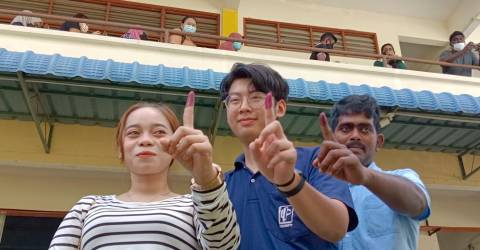PETALING JAYA: With 1.4 million youths in the 18 to 20 age group having joined the voter list in the 15th general election, questions have been raised on whether they had the political maturity to help elect a government.
While their numbers made up only some 9% of the total 15.46 million voters who turned out to cast their ballots, it still caused much debate on social media platforms, with many questioning if these youths even understood the issues facing the country to make an educated choice and if their votes count.
This was especially so when TikTok videos emerged of youths expressing support for a certain political party, while criticising specific individuals and another political party.
While the matter is currently under police investigation, the larger issue is whether Parliament’s passing of the Constitution (Amendment) Act 2019 (CA2019), which was gazetted into law on Sept 10, 2019, to lower the voting age to 18, was the right thing to do, given the level of maturity of those aged 18 to 20.
VoteMalaysia global coordinator and Malaysia Students Global Alliance senior vice-president (advocacy) Jonathan R.S. Lee said there is a lack of media and political literacy in Malaysia’s secondary and tertiary institutions to educate youths on political matters.
“The curriculum in educational institutions (except for political science) does not teach topics on the electoral process, how Parliament works and the differences between parliament and state legislative assemblies.
“I foresee that educating people on political literacy will mostly come from individuals such as Fahmi Reza and his ‘Kelas Demokrasi’ as well as NGOs. Thus, to have future generations that understand the political process and what democracy means, the government must step up and enhance current educational curriculums from age 16.”
Lee also said the dilemma faced by first-time voters, especially those aged 18 to 20, is they are being criticised for their decision regardless of which party or candidate they voted for.
“We do not have Election Commission data to analyse whether a certain age group prefers and voted for a particular political party.
“Besides, there are no analytics available on the percentage or voting trends of 18 to 20 year olds, compared with other age groups.
“Saying that young voters have a poor understanding of politics is unfair and people should refrain from amplifying such assumptions without access to proper data.”
Undi18 co-founder and advocacy director Tharma Pillai said in exercising the democratic right to vote, each ballot cast involves a sense of responsibility.
“Undi18 fought to lower the voting age so that youths can be more involved in the nation-building process.
“This also encourages the narrative of youth power, where young Malaysians have a say in the direction the country takes,” he said.
As an organisation, Undi18 put together several political literacy and leadership programmes such as Seeds for Democracy, which is a democracy-building camp.
“We also organised Parlimen Digital, which gathered 222 youth representatives to show the feasibility of a virtual parliamentary democracy, and Dewan Muda Malaysia, a platform to understand the parliamentary system and be educated on policy matters.
“Besides that, Undi18 also organised Sekolah Rukun Negara with the Youth and Sports Ministry. We travelled throughout Malaysia and spoke to thousands of youths in schools on democracy, unity and national harmony,” he said, adding that these were some of the initiatives that were carried out to educate them on political processes.
Benar Betul media literacy initiative founder Jeremy W.H. Lau said with the implementation and enactment of CA2019, political and media literacy needs to be addressed as part of the core agenda in the education system.
“To nurture young leaders who are critical, compassionate and care about their surroundings, the authorities need to start by providing a safe space and freedom to be politically active.
“This will encourage constructive involvement and defeat political apathy. Advocacy initiatives from youths should be welcomed with open arms and be heard,” he added.
